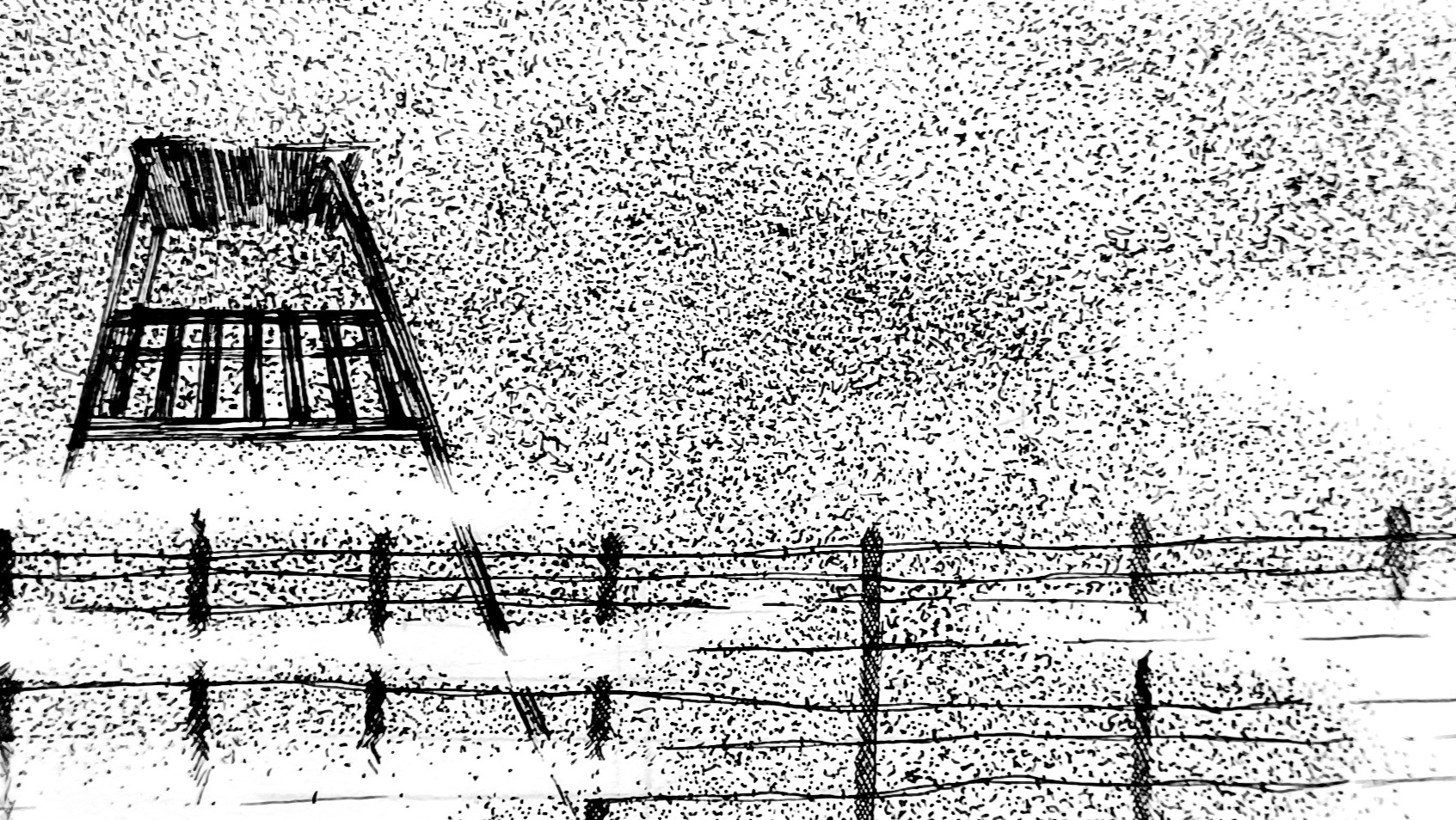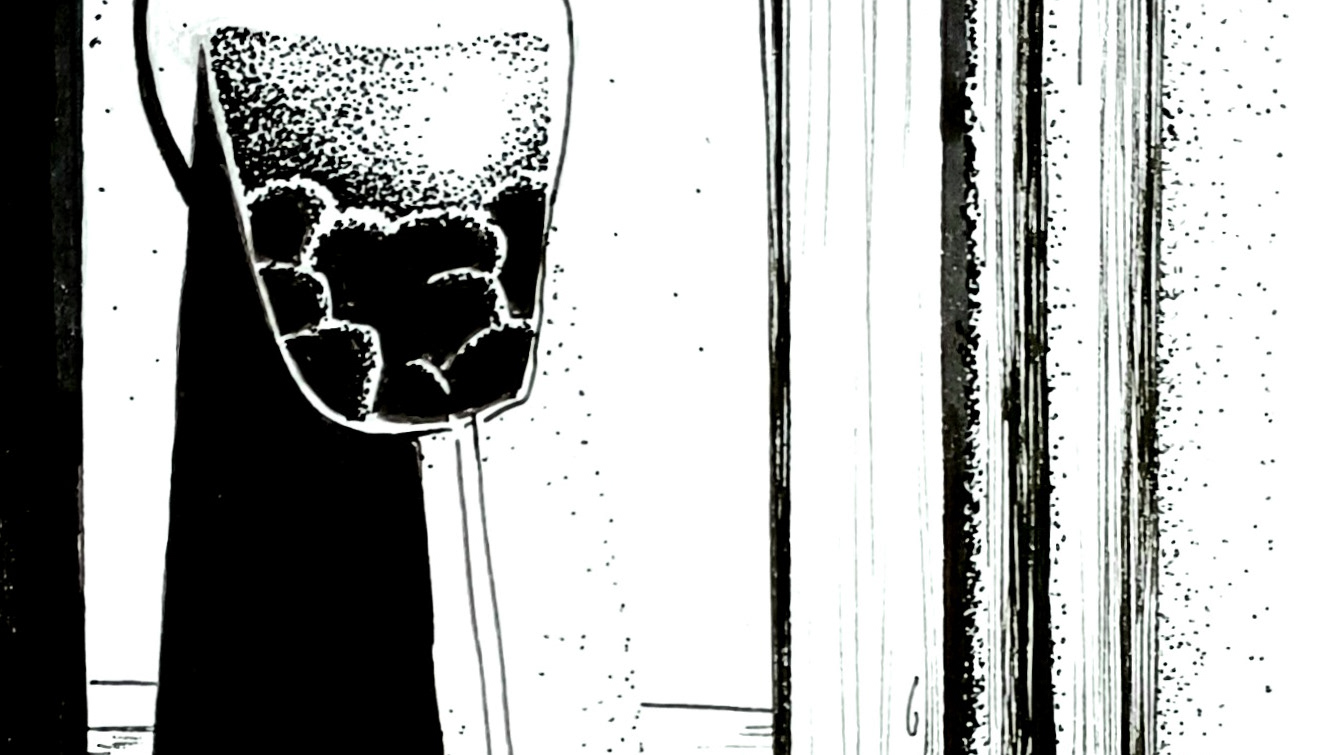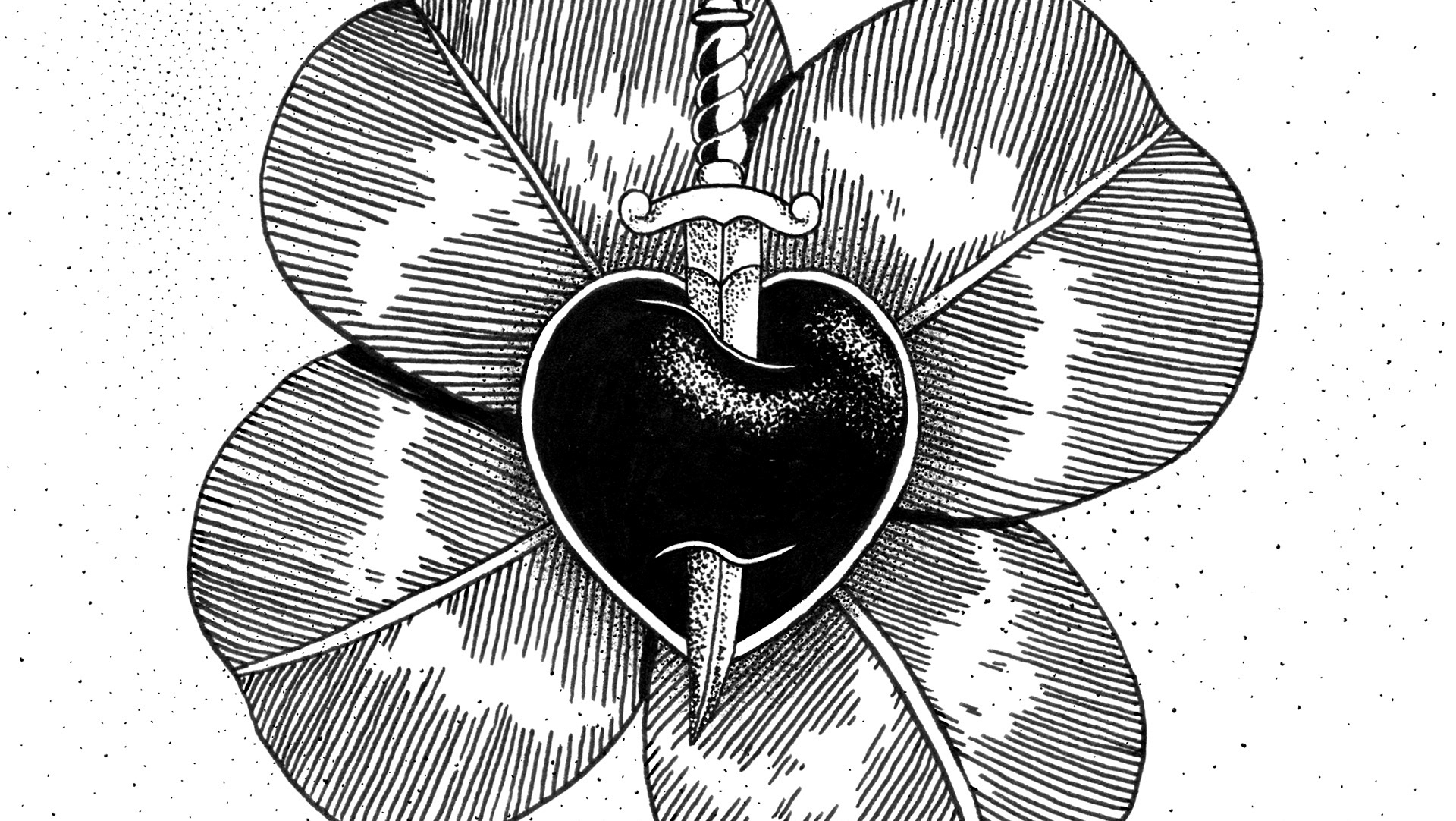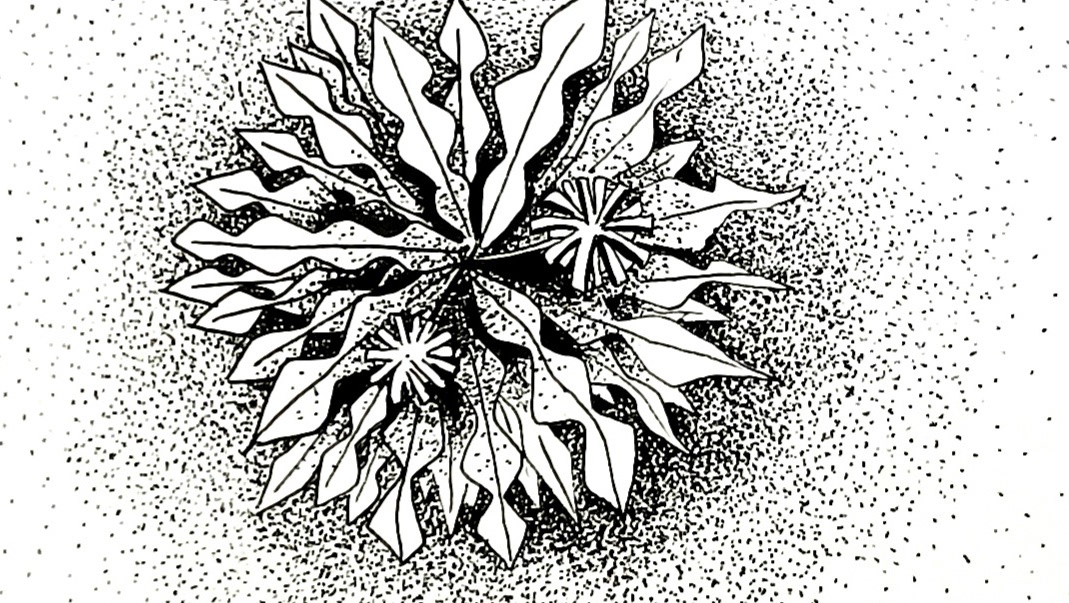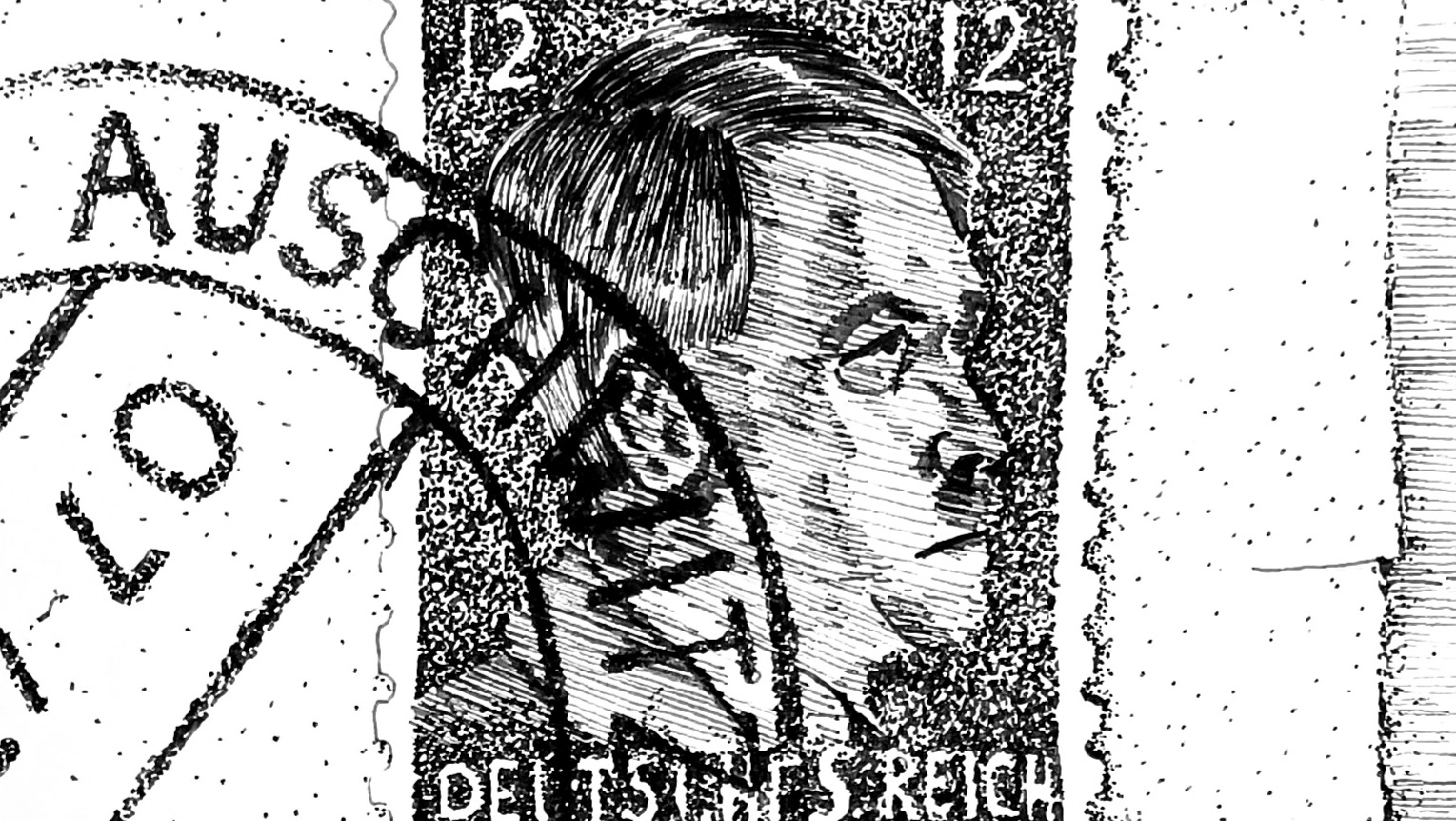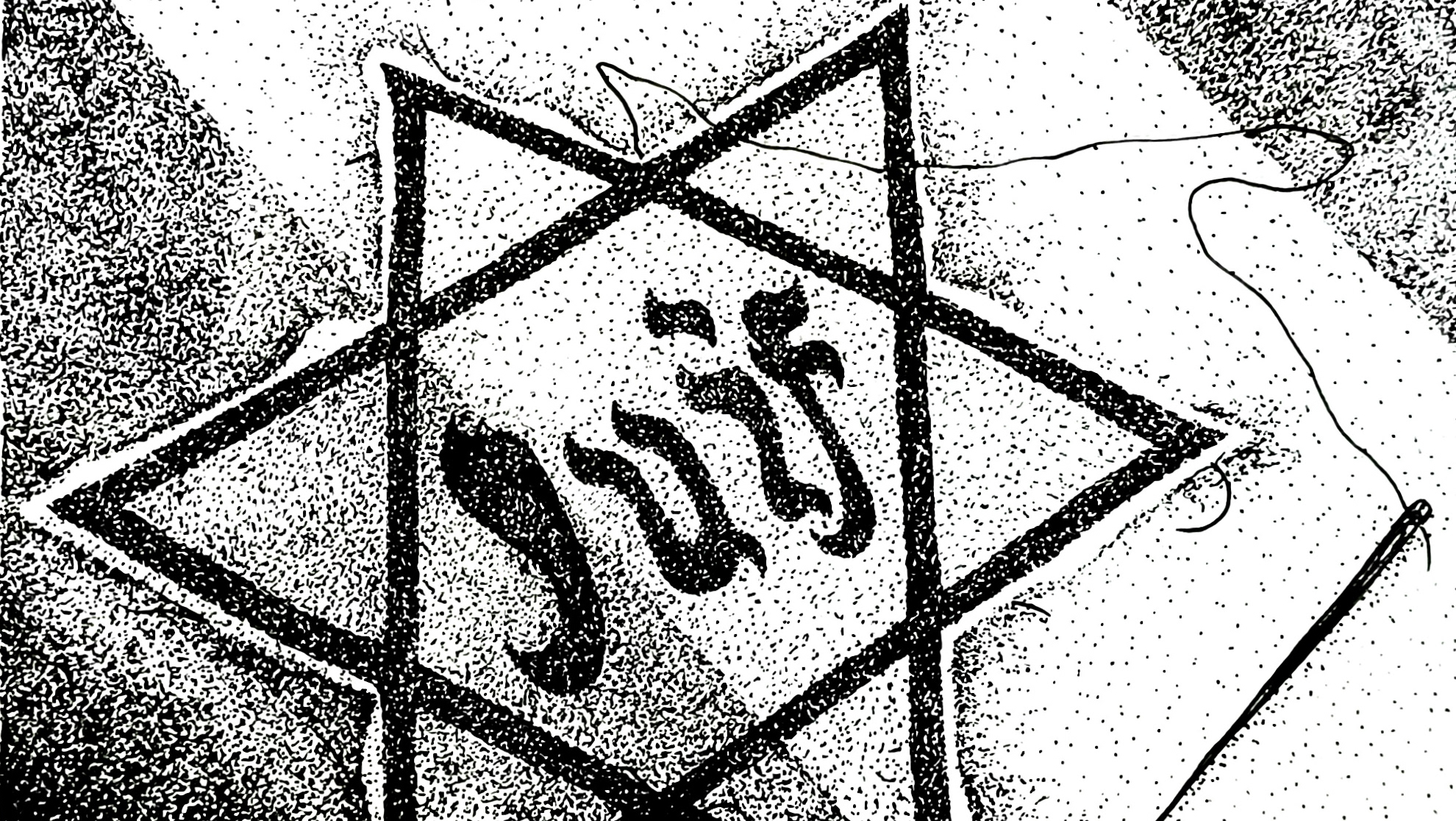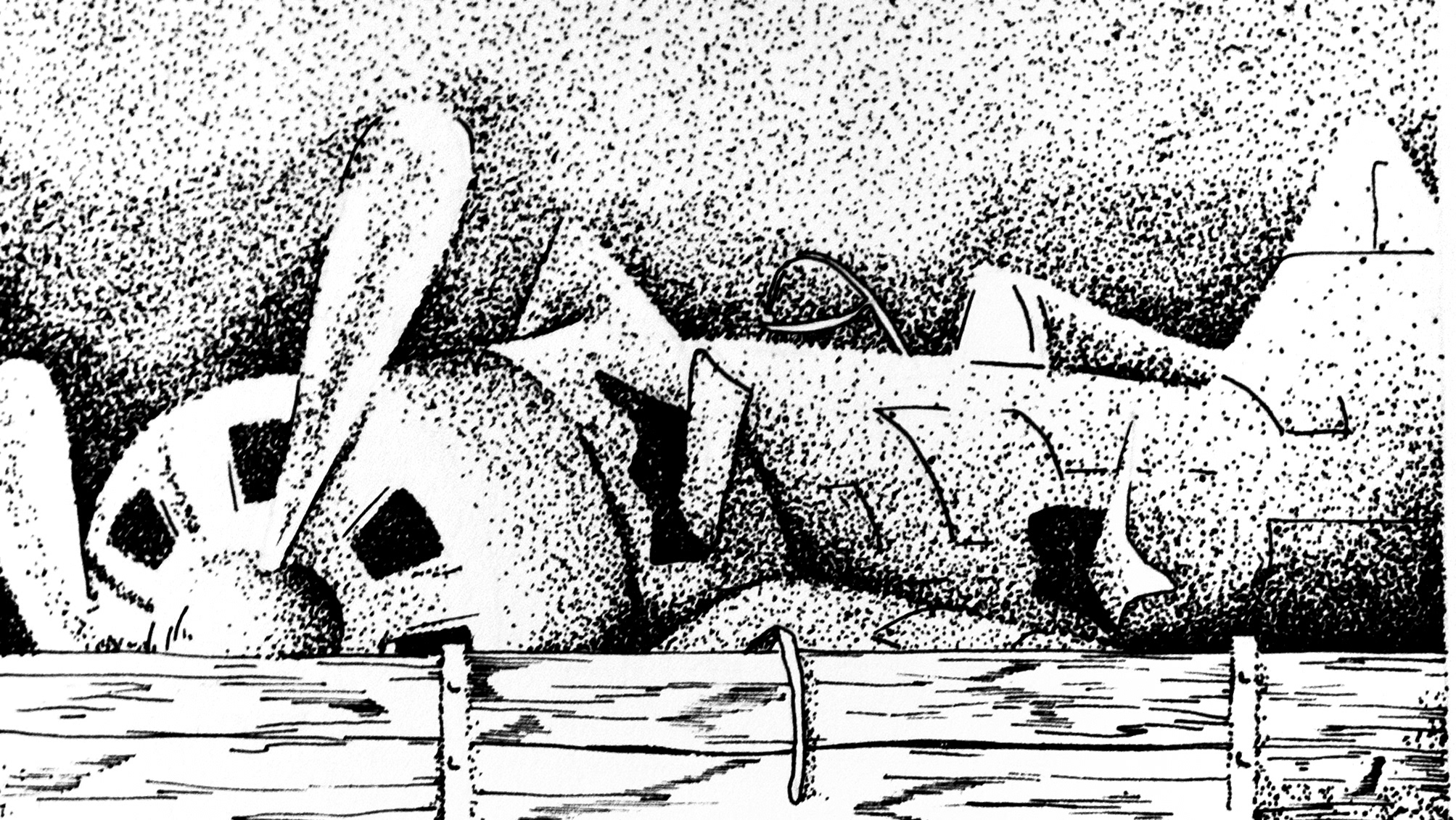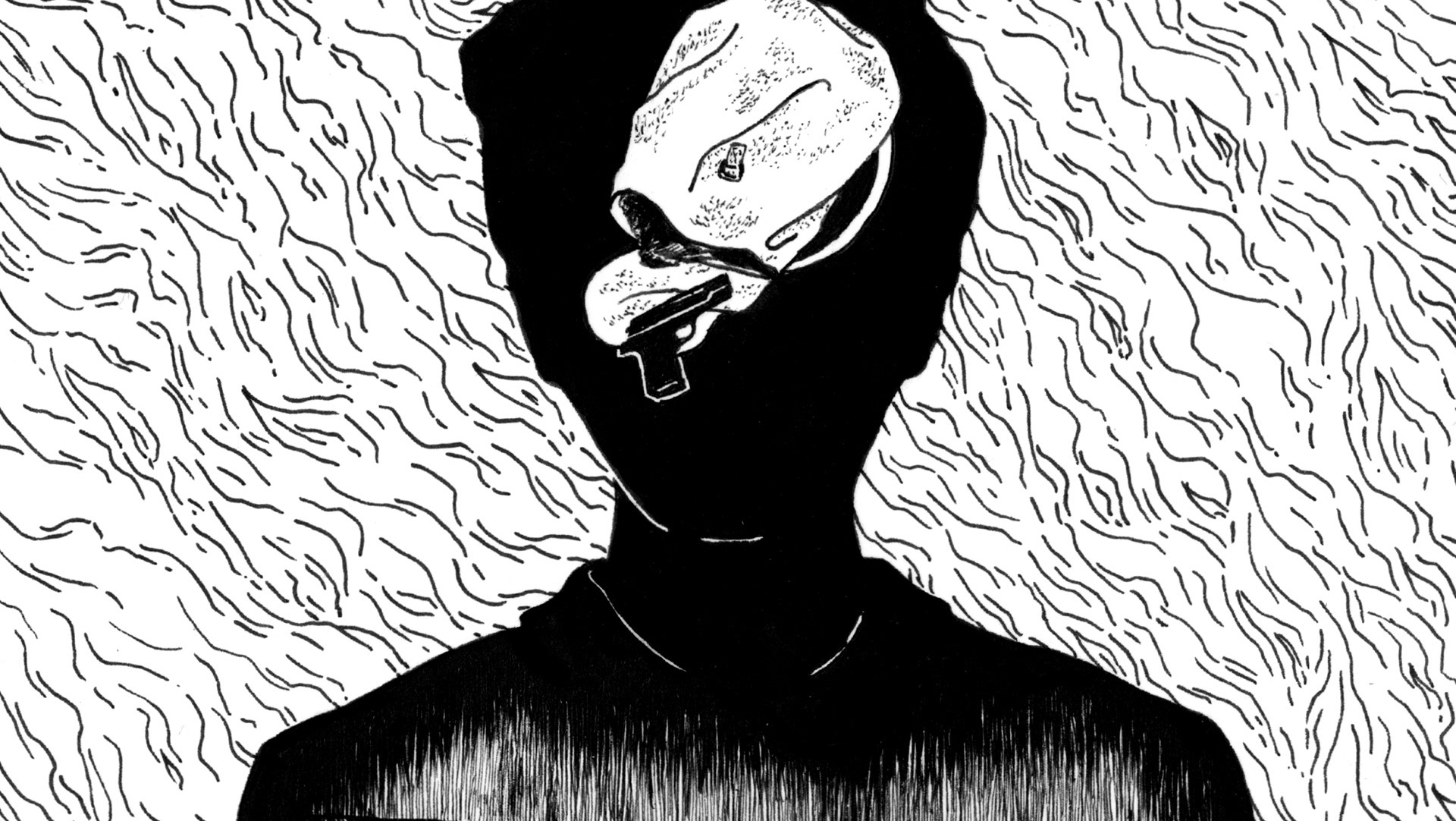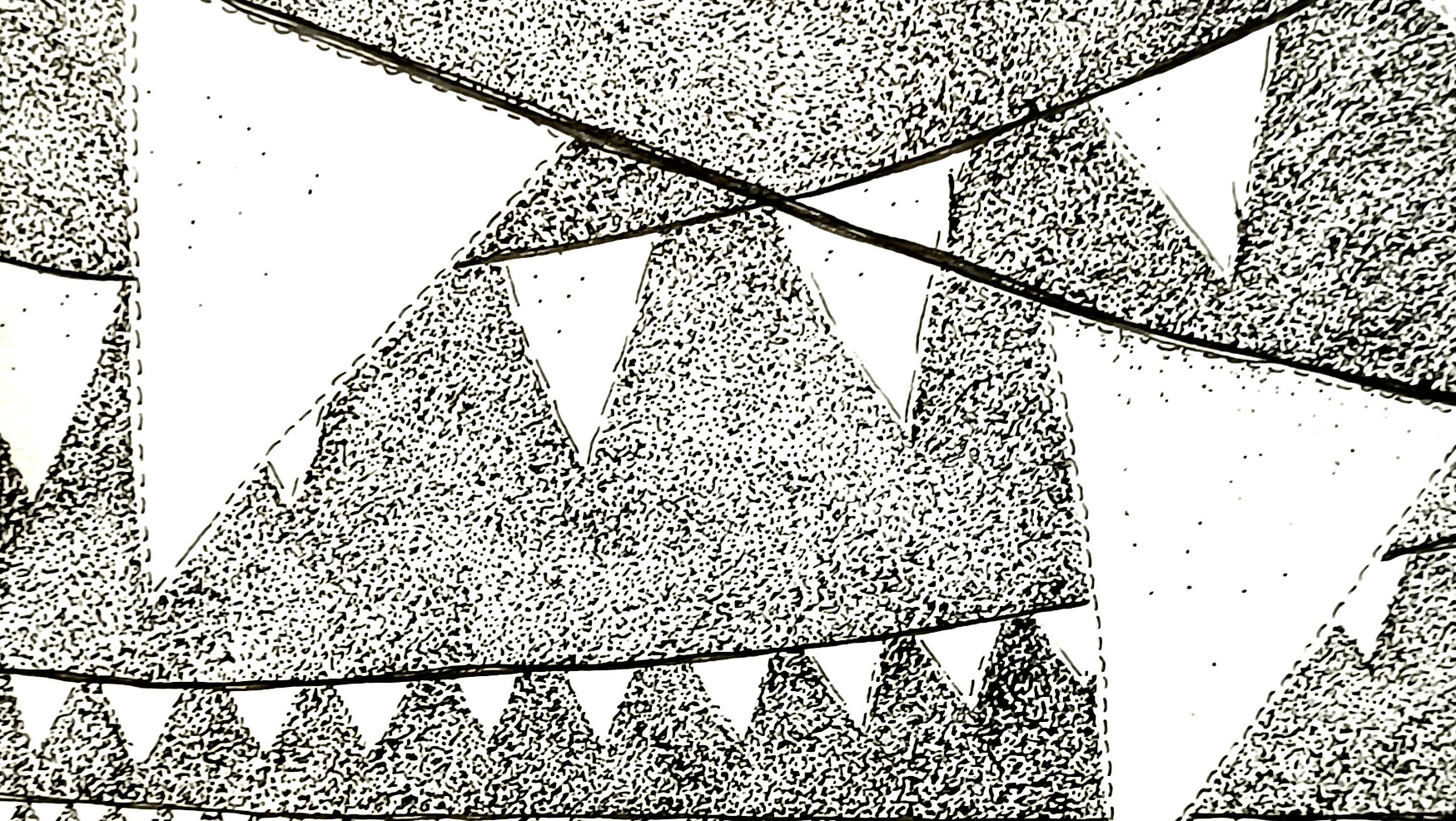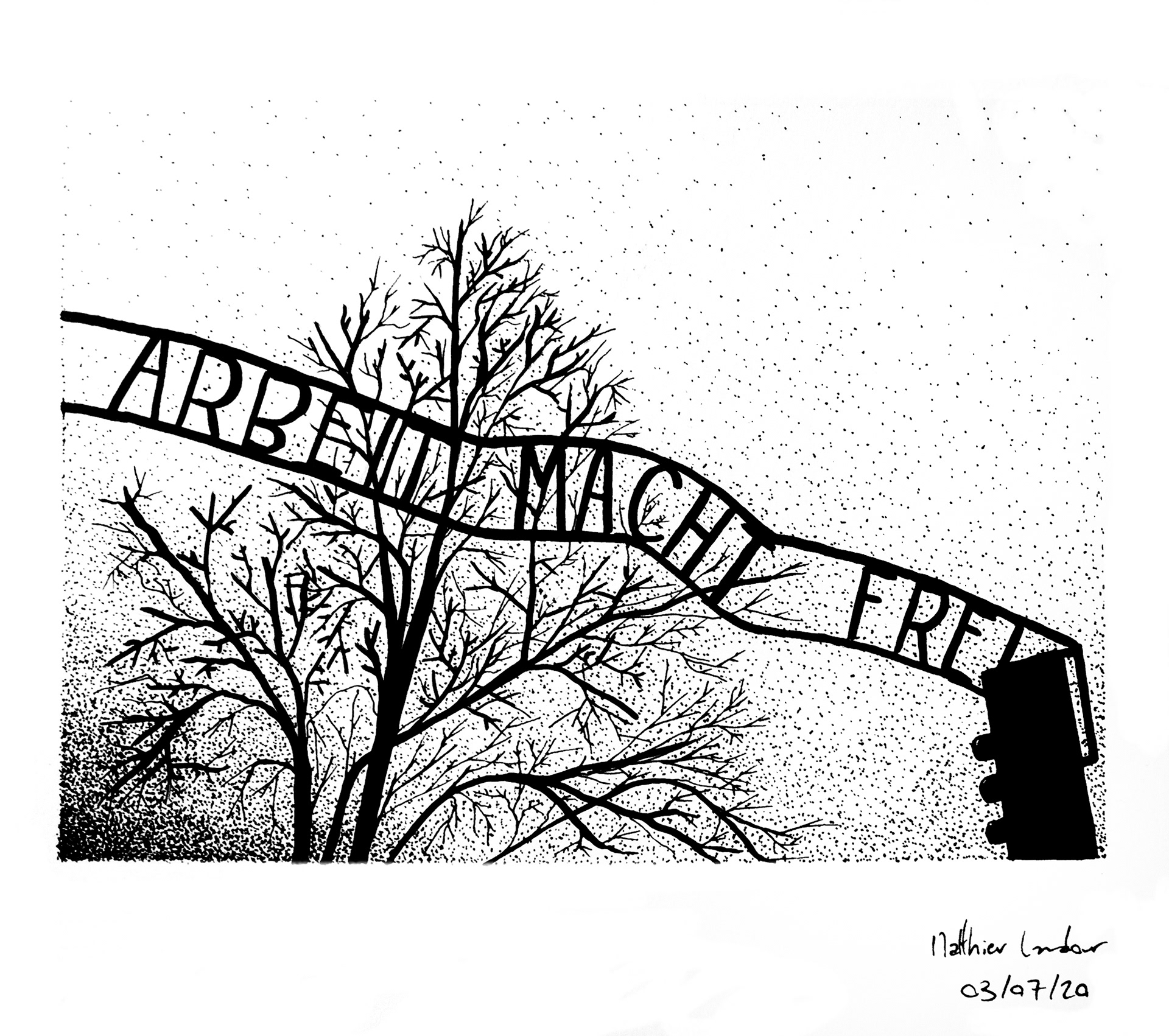
The entrance
Today is the 8th of July 1942, and the train transporting the 1170 hostages is slowing down. Some believe they are in Poland, maybe beyond, no one is quite sure.
The previous night was horrific, no more water, no more food. It rained at one point, everyone ran to the windows, hoping to catch a few drops on their hands. It didn't rain for long.
The train stops, yet there is no station. The landscape is grey, drier than a desert, no grass, only mist and dirt. This looks like a camp, yet it looks like no other camp. It is massive, you can't see the end of it, only ranges of trees in the far distance. The most striking are the prisoners, so thin, so alike, so difficult to differentiate. This is beyond any comprehension.
No time to digest what they are looking at... The doors open, violence starts. Dogs bark, the guards push the prisoners, attacking them with wooden rods. You wouldn't expect it to hurt so much, yet the rods are covered in lead. Screams everywhere, the hostages are ordered to leave the luggage/ on the side. No time to discuss, those who wish to complain receive more hits. Just like that, aside from what is in their pockets, all their possessions are gone.
Now they must form a line of 5 and start walking. The guards don't stop hitting the hostages, this is insane, but already nobody wishes to complain any/more, the previous ones who tried can barely walk straight. They finally get to the camp, there is no name, only a metal inscription on top of the entrance, "arbeit macht frei", work/ frees you, or work is freedom, or maybe work sets you free, maybe the last one makes more sense. The hostages would laugh at it if they weren't beaten regularly by those guards.
They can hear music, an orchestra over there plays old waltzes, maybe the barcarolle by Offenbach The hostages are ordered to stop and wait to get into a building one by one, block 27.
They wait.
A SS officer comes in and orders all the Jewish prisoners in the group to come forward. They obey, there are around 50 of them, the last Jewish prisoners of the Royallieu camp, all the others had been deported months before. As they do so, one of them, confused, asks again if he should come forward or backward, he apologises for not speaking German. The SS officer comes to him and beats him, without a word. And just like that, the SS officer leaves. What just happened?
Everyone is confused, tired, hungry, thirsty, hurt, there are so many questions, some already worry about the answers, or simply asking the questions. They fear the other prisoners, the way they look, they wonder if they will become like that soon. It maybe is better to talk about something else.
A few months earlier: on the 20th of May 1942, a policeman began his work day. He started his shift at the Albert police station, it was a normal day, almost like any other.
Since the defeat, the German authorities have occupied the police station, a specific unit stays there, the Feldgendarmerie. The policemen kept doing their job, but from time to time, they needed to accompany the feldgendarmerie for specific missions.
Today was one of those days, the policeman and a few colleagues needed to follow the German authorities. There was no explanation, they were told nothing, only to follow. Sometimes, they were given explanations, sometimes they figured it out for themselves, but most times they had to accept the question mark over their heads. The policeman was no fool, he knows his presence made the fledgendarmeie’s actions more tolerable, the collaboration more acceptable. But after all, if Marshall Petain believed that collaboration was necessary, then the policeman was to follow. Petain knew what he was doing.
So the policeman followed, all the way to the Potez factory in Meaulte. He knew the place well, an aircraft manufacturer, making the whole area proud. This was where the Potez 25 were made, jewels of French aviation, technological beauties, perfect for recon missions as well as perfect for the French airmail service. Since the occupation, the aerodrome was used by the Luftwaffe, and the Potez factory, already nationalised a few years prior, was used for the German war effort. The factory was only a few kilometers away from Albert, it was a short trip. The German soldiers showed one single name, the policemen asked for it at the factory. A man came in, and just like that, Jean Fletcher was under arrest.
Back to the present: as they are still waiting in front of a building, one of the hostages, the young Georges Guinchan, sees someone he knows, Armand Schkolnic. They had met in Royallieu, Schkolnic was deported a month prior, as a Jewish prisoner. Georges could barely recognise Armand, he had lost a lot of weight, his face was so much thinner, he was a very different man. Armand asks a few questions about the situation in France, Georges hesitates to ask him about this camp, yet he needs to gather as much information as possible. With a quiet voice, without any emotion, Armand tells him most of the people deported with him had died, he says no one survives more than a couple of months here, he himself will probably die in a few days. He shakes Georges' hand, wishes him good luck, and leaves him. Georges doesn't understand, surely no one would say something that horrible so quietly, this must be a sick joke, surely Armand will come back, smile and say he was messing around. But Armand has already vanished into the distance, lost in an ocean of prisoners.
Back to Meaulte, a few months earlier: the policeman escorted Jean Fletcher back to Albert. The policeman didn't know him personally, but his name rang a bell to everyone around town. After all, Jean, whose name was originally John, was the only Scotsman living in the area. Jean was discreet, polite, he exchanged a few words with the policeman in / flawless French, and asked if his wife Lucia could be warned. The German authorities remained silent, the policemen answered they would see what they could do.
The policeman wondered what Jean could have done, but he had no information. Jean was a guard at the Potez factory, maybe it had to do with the arrest of 3 other men 7 or 8 months earlier? Maybe he was only arrested because he was a Scotsman? How about a spy? This sounds absurd, how could Jean still be in contact with the United Kingdom from Albert?
The policeman expected to stop at the city town hall in order to drop off Mr Fletcher yet the German authorities wanted to make another stop.
The cars stopped in front of the Pignet hairdressing salon, one of the German men pointed to the place. The policeman knew the place well, as everyone did around here, he was looked after by either Ernest Pignet, or his son Rene.
Why would they be under arrest? The policeman had no idea. Was the arrest connected to Jean Fletcher? The policeman asked one of the members of the feldgendarmerie, he first replied in German, then a few words in French, no new information was given.
Back to the present: on the 08th of July, the prisoners get called inside a building one by one, starting with Roger Abada. Then Maurice Courteaux, Paulin Coutelas, Charles Coutereau, Julien Crampon, Paul Crauet, Jean Creignou, Andre Crepin, Albert Creuset, Henri Creutzer, Gustave Crochet, Rene Cronier, and so on. Inside, they are ordered to put all their belongings in a bag, money, rings,... They are told these will be given back when they leave, yet no one mentions anything about the luggage they left near the train. They are given a number, between 45157 and 46236, they must remember this number at all times, this is their new name now, a number.
The hostages become the 45000.
Now they must undress, then they are shaved entirely. The process of all looking alike begins. Bold and naked, they must wait outside again, in front of another block, this is humiliating. They have no clothes, no possessions, no hair, only a number between 45000 and 46000. They wait again, get called again, questioned about their health and have a shower. A hot shower, burning even, but after 2 days in a train without water, at least this feels satisfying. Finally, they are given clothes, dirty clothes with stains you wouldn't dare wondering about, and wooden shoes unfit for anyone .
One by one, they are brought to another block, number 26, at the photo studio. Someone takes a picture of them, a sign attached to a post in front of them indicates their number, nationality and category. BV-F, Berufsverbrecher-franzosich. It means French criminals.
Back in Albert, a few months earlier: the day finally ended for the policeman. It had been a stressful shift. Questions remained without answer, even for him. The German authorities came to the hairdressing salon and arrested Ernest, Rene and Flora Pignet, without a word, without a reason.
Flora Pignet was released a few hours later, without a word either. The policeman has no idea where the 3 men are going, if they were to stay at the town / hall / for some time or if they were to be transferred someplace else.
More questions remained at the end of the day than at the beginning, the policeman wasn’t even sure if the felgendarmes knew more or were following orders of their own.
Whichever the case was, the policeman tried to reassure himself. Surely, the 3 men won’t go too far, or for too long. Even under the occupation, they were still French citizens, they would be treated fairly. Pétain had promised.
Back in Poland: the day ends for the prisoners as well. Once again, they are told that they will receive food. But it's already late, and only a dozen prisoners receive anything before they are told to go someplace else, block 13.
2 rooms, 1000 prisoners in 2 small rooms, no beds, nothing. This is where they must sleep tonight. This is too small for everybody to lie down, the 45000 do their best to get some sleep, hoping the night won't be too short. For some, sleeping is impossible, understanding what is happening to them is impossible, including for Jean Fletcher, Rene and Ernest Pignet.
Before the train stopped, some of the hostages, now 45000, had seen a sign at the previous city nearby, Auschwitz. This is their first night in the Auschwitz-Birkenau concentration and extermination camp in German-occupied Poland.
Notes
Thank you very much for listening to this episode of 3100045000, the story of 2 trains of French members of the resistance. My name is Matthieu Landour Engel and from this point on, I would like to give a warning, as some details of this podcast are violent and graphic, even in a radio format.
This episode focuses on the arrival of the train, their first day, the creation of their group, 45000, and also 3 characters, Ernest and Rene Pignet, and Jean Fletcher.
When the prisoners arrived in Auschwitz, they had no clue where they were. At this point of the second world war, even though people had knowledge of concentration camps, few had heard about the Auschwitz concentration complex, nor of the extent of what was happening there. The Auschwitz nazi German concentration camp is an unusually large complex, close to the city of Oswiecim, in German-occupied Poland. It consists mostly of 3 areas, Auschwitz, Auschwitz-2- Birkenau and Auschwitz 3- Monowitz. I will talk at length in this podcast about Auschwitz and Birkenau, but I won’t talk about Monowitz, as neither the 45000 nor the 31000 went there. I can recommend this masterpiece “If this is a man” by Primo Levi, who spent most of his deportation in Monowitz.
Auschwitz was originally a concentration of Polish army barracks, which were then converted into a camp for Polish prisoners. The first transport was on the 14th of June 1940, it was a transport of Polish male political prisoners, I will explain this further in another episode.
Auschwitz was around 1000 m long and 400 wide, it had a semblance of road and 22 brick buildings, including 20 blocks for prisoners and 2 other buildings used as an office and a hospital for the SS. 8 new buildings were later built, from May 1941 until early 1942. This may feel like a small area, it is indeed much smaller than Auschwitz 2 Birkenau, which is a far bigger area, but I will explain this further in another episode.
The prisoners lost their luggage as they stepped off the train and walked to the Auschwitz camp. At the time,. the train station hadn’t yet been extended so the train station was a short walk from the camp. This would change in the future.
The prisoners walked under the famous Arbeit macht frei sign, not all of the prisoners spoke German, so they didn’t necessarily understand what it meant.
The prisoners waited, had to empty their pockets, were shaved, asked about their health, were photographed, I must point out that at that time, they were not yet tattooed, they were to be tattooed some time later. They were given their numbers, between 45157 and 46326, which is why they were called the 45000.
1170 people were registered. Earlier, I mentioned that 1175 men left and actually 1170 arrived, so there were 5 people missing. Out of those 5, 3 escaped, Jean Lebouteiller, Felix Bouillon and Julien Becet, and 2 died inside the train. It is not known precisely how they died, and it was not uncommon for prisoners to die during the travel, given the dreadful transport conditions. Yet speculation were that those 2 people were killed, as they were suspected of being den/unciators. yet it is not proven.
They arrived with what is named a Nacht und Nebel decree, which translates as night and fog, which means that the prisoners couldn’t get in touch with the outside or their families, nor could their families get in touch with them back in France. They were to stay until further notice, disappear in the night and the fog, hence the name Nacht und Nebel.
They were given a green triangle and the appellation berufsverbrecher französische, which means French criminal. This may have been a mistake, as they were supposed to be given a red triangle, and would actually be given a red triangle rather than a green triangle some time later.
The extermination of the Jewish population had already started, the first gas chamber started working in February 1942, although it had been tested prior. Crematoriums were already in use, and gas chambers and crematoriums started operating also in Birkenau, from March 1942 on. It must be noted that the 2 rooms where the 45000 spent their first night were the rooms where the Zyklon B gas had first been tested. The cellars of block 13 were used to kill some 250 sick prisoners selected from the hospital, along with about 600 Soviet POWs, on September 3, 1941. They couldn't know that information, but it is a chilling fact.
This episode also focused on the arrest of Jean Fletcher, as well as Rene and Ernest Pignet. For many families of the 45000, painful questions remain. This is the case for the arrest of those 3 men, on the same day. Although there are several possible explanations, nothing is entirely sure, and it probably never will be. Mr Fletcher and Mr Pignet father and son may have helped prisoners of war escape, and may have been denounced afterwards. Maybe Mr Fletcher was arrested only because he was a Scotsman, maybe the fact that he was during the first world war a part of the British intelligence corps was a reason. There are other stories, maybe Mr Fletcher’s wife, who ran a bar, collected information for the resistance, there is also a story of Pignet father and son throwing grenades into a lake near/ the city of Albert, in order to get rid of the weapons before a possible arrest, yet that story doesn’t have any connection with Mr Fletcher. Very little is known unfortunately, which is why I attempted to take the point of view of a policeman on the day of their arrest, whose job that day was to accompany the German authorities to arrest the 3 men, and even he wasn’t sure why.
It is worth noting that Mr Fletcher was the only Scotsman in Auschwitz-Birkenau, also most probably the only British man in the camp.
The feldgendarmerie was a type of German military police working on occupied territories. Their tasks were varied, from traffic control to partisan arrest. They were often assisted with French authorities, like in this story, for various reasons, mostly for language reasons, as they didn’t necessarily speak French, but also because the presence of a local authority would make any situation more acceptable for the occupied citizens. in the case of this episode, we can suppose that the feldgendarmerie was accompanied by french policemen, yet I can’t prove it entirely.
I was lucky to get in touch with Francoise Tomeno, who took the time to tell me about her family, the Pignet family. She corrected my text several times, however painful it was for her. I made mistakes along the way and she helped me navigate and correct those mistakes, I am thankful.
I was also very lucky to get in touch with Tony Millett, a relative to Mr Fletcher, who kindly exchanged comments with me and reviewed this chapter.
I was lucky to be in direct contact with the museum of Auschwitz. I received several notes from Ms Ranogajek, Ms Popalsa and Mr Poplinski, the head of bureau for former prisoners of the archives Museum of Auschwitz Birkenau Many many thanks to them for their precious help.
My sources for this story are the book “Red triangles in Auschwitz”, by Claudine Cardon-Hamet, the website deportes-politiques-auschwitz.fr, memoire vive and the foundation for the memory of deportation website and the fantastic website auschwitz.org
That’s it for today, the next episode will be about the first day of the 45000 in Birkenau and about Robert Levillon, a mathematics and philosophy teacher.
